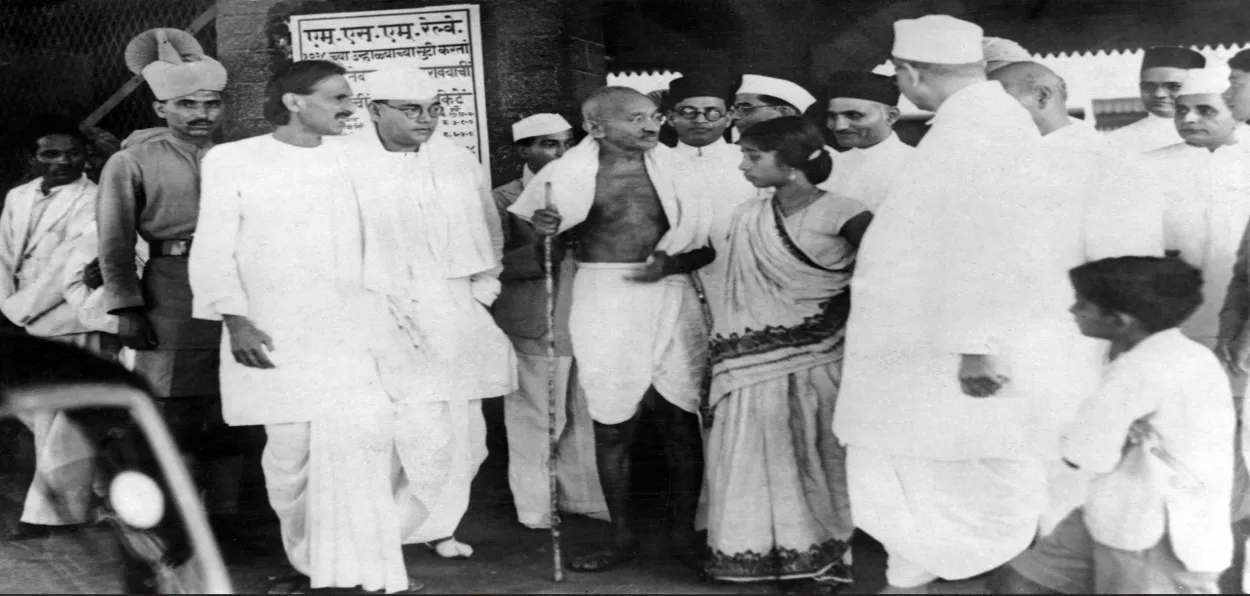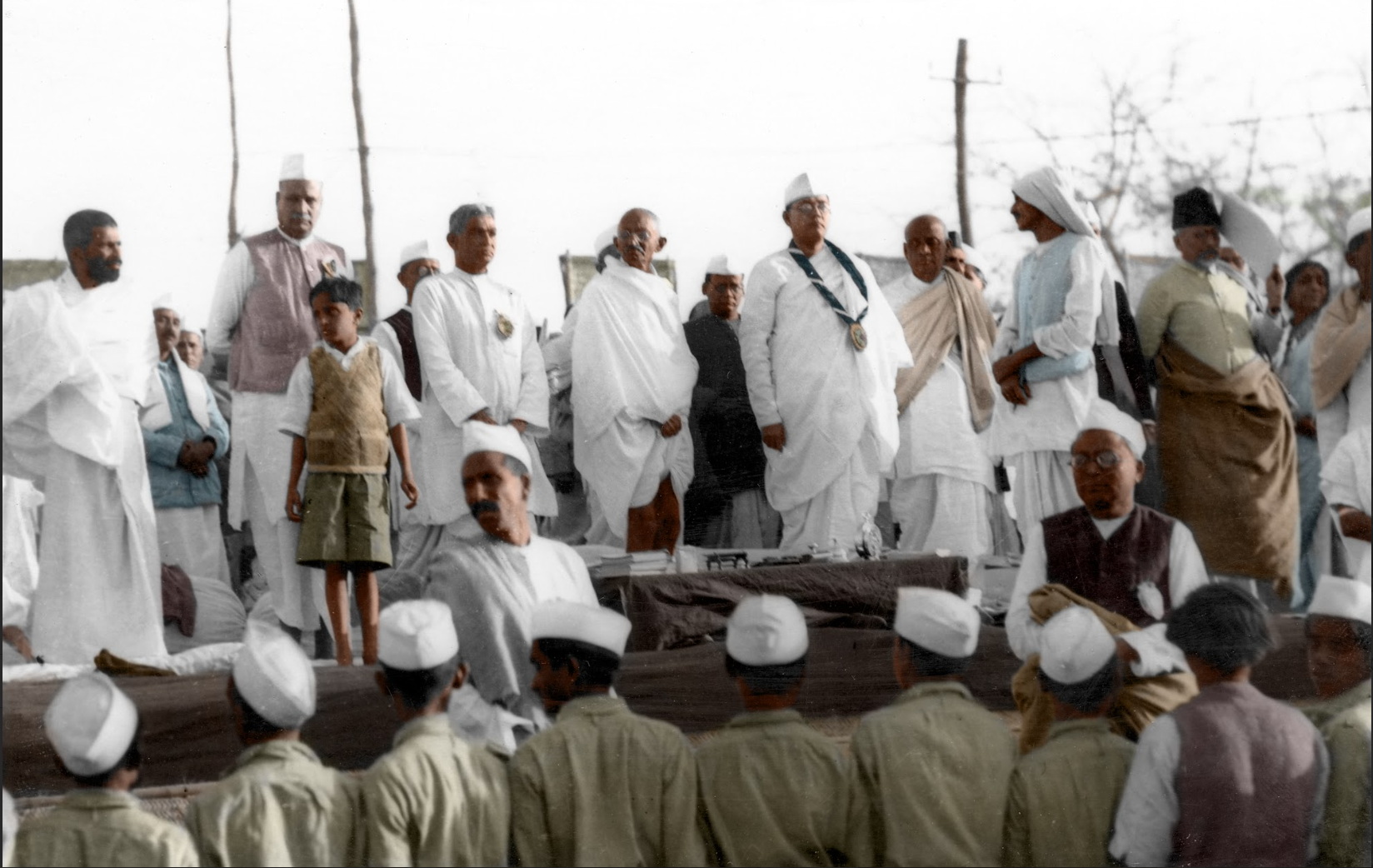
Saquib Salim
“Mahatma Gandhi has rendered and will continue to render phenomenal service to his country. But India's salvation will not be achieved under his leadership.” Subhas Chandra Bose wrote about Gandhi in his 1935 published book, The Indian Struggle: 1920-34.
“What did Subhas Chandra Bose think of Mahatma Gandhi?” is an oft-asked question. I see social media posts about this. Gandhi's admirers tried to convince them that Bose considered him the supreme leader of the Indian Freedom Struggle and the Gandhi bashers wanted us to believe that Bose ‘hated’ him.
Bose wrote a book in 1934, four years before his differences with Gandhi became public. The book he wrote during his exile in Europe had a chapter - The Role of Mahatma Gandhi in Indian History - in which Bose looked into the nuances of Gandhi's leadership and politics.
Bose believed that Gandhi’s methods would not have made any impact outside India. He argued, “There is something in Mahatma Gandhi, which appeals to the mass of the Indian people. Born in another country he might have been a complete misfit…. In India it is different. His simple life, his vegetarian diet, his goat's milk, his day of silence every week, his habit of squatting on the floor instead of sitting on a chair, his loin-cloth-in fact everything connected with him - has marked him out as one of the eccentric Mahatmas of old and has brought him nearer to his people. Wherever he may go, even the poorest of the poor feels that he is a product of the Indian soil— bone of his bone, flesh of his flesh. When the Mahatma speaks, he does so in a language that they comprehend not in the language of Herbert Spencer and Edmund Burke, as, Sir Surendra Nath Banerji would have done, but in that of the Bhagavad-Gita and the Ramayana.”
Bose argued that Gandhi was a creation of his time in history. In his view, if he lived during 1857, when Indians were fighting against the British with arms and needed a commander, Gandhi’s non-violence would not have made any sense. In the 1880s when the Indians were fighting with constitutional methods, then also his ideas of non-cooperation could not convince people.
Bose wrote that at a time when the Indian constitutionalists had failed and revolutionaries had no impact during the World War years, “Then there sprang up India's man of destiny- Mahatma Gandhi -who had been biding his time all these years and quietly preparing himself for the great task ahead. He knew himself-he knew his country's needs and he knew also that during the next phase of India's struggle, the crown of leadership would be on his head.”
Gandhi, according to Bose, was the man who converted Congress into a mass movement. He acknowledges ct that people listened to Gandhi and he had brought them together as a single force to fight the British with his “single-hearted devotion, his relentless will and his indefatigable labour .”
 Subhash Chandra Bose with Mahatma Gandhi
Subhash Chandra Bose with Mahatma Gandhi
Gandhi was not too revolutionary for the majority, Bose argued, and that was why they were not frightened of him. His policy was of unification and he tried to unite Hindus and Muslims; Upper Caste and Lower Caste; Rich and Poor; Landless and Landowners with considerable success. After acknowledging this Bose puts forward a question, “With such purity of character and with such an unprecedented following, why has the Mahatma failed to liberate India ?”
"We have to render unto Caesar what is Caesar's - and in a political fight, the art of diplomacy cannot be dispensed with. He has failed, because he has not made use of the international weapon. If we desire to win our freedom through non-violence, diplomacy and international propaganda are essential. He has failed because the false unity of interests that are inherently opposed is not a source of strength but a source of weakness in political warfare. The future of India rests exclusively with those radical and militant forces that will be able to undergo the sacrifice and suffering necessary for winning freedom.
"Last but not least, the Mahatma failed, because he had to play a dual role in one person - the role of the leader of an enslaved people and that of a world teacher, who has a new doctrine to preach. It is this duality which has made him at once the irreconcilable foe of the Englishman, according to Mr. Winston Churchill, and the best policeman of the Englishman according to Miss Ellen Wilkinson.”
Bose believed in socialism, economic equality, and social justice. For him, Gandhi was not doing enough to ensure socio-economic justice in the society. He prophesied, “The Mahatma has endeavoured in the past to hold together all the warring elements - landlord and peasant, capitalist and labor, rich and poor. That has been the secret of his success, as surely as it will be the ultimate cause of his failure. If all the warring elements resolve to carry on the struggle for political freedom, the internal social struggle will be postponed for a long time and men holding the position of the Mahatma will continue to dominate the public life of the country, butt that will not be the case. The vested interests, the ' haves', will in future fight shy of the 'have-nots' in the political fight and will gradually incline towards the British Government. The logic of history will, therefore, follow its inevitable course. The political struggle and the social struggle will have to be conducted simultaneously. The Party that will win political freedom for India will be also the Party that will win social and economic freedom for the masses.”
It is not to say that Bose had become hopeless of Gandhi. He hoped that this great leader of the Indian freedom struggle would adopt radical policies. Bose hoped, “Whether he will be able to retain that political following in the years to come in the event of the British attitude being as unbending as it is today, will depend on his ability to evolve a more radical policy. Will he be able to give up the attempt to unite all the elements in the country and boldly identify himself with the more radical forces? In that case, nobody can supplant him. The hero of the present phase of the Indian struggle will then be the hero of the next phase as well.”
ALSO READ: Muslim soldiers of Netaji Subhash Chandra Bose
A few years later, at the Tripuri Session of the Indian National Congress, Bose was forced to resign as President even after defeating a Gandhi-backed candidate. he sought international support for the freedom struggle while Gandhi tried to unify Indians. The methods grew diametrically opposite as both kept acknowledging each other as a ‘Patriot with the wrong approach.'
